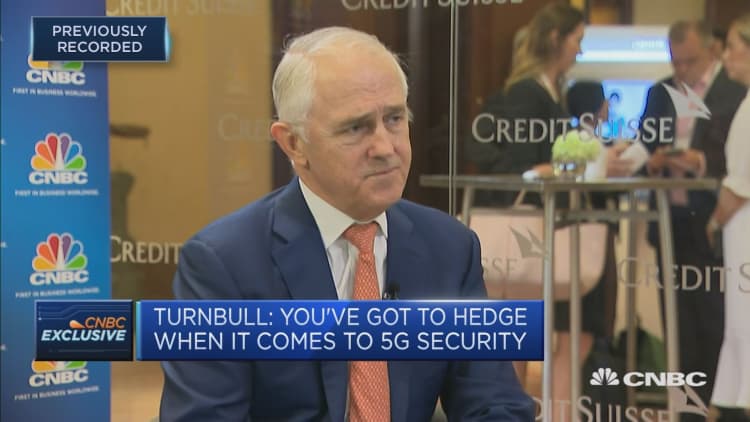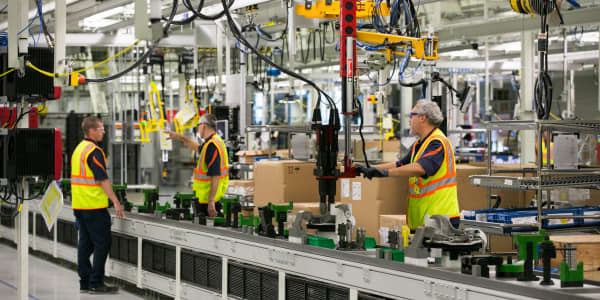
The Australian government had tried hard to find a way to include Huawei and ZTE in the country's push to build the next generation of high-speed mobile internet, according to its former prime minister Malcolm Turnbull.
But it couldn't mitigate the risks posed by the Chinese telecommunication equipment sellers, he told CNBC's Nancy Hungerford at the Credit Suisse Asian Investment Conference in Hong Kong.
Last August, Australia banned Huawei and ZTE from selling 5G equipment in the country due to national security concerns. In the same month, Turnbull was ousted from his position as prime minister.
On Thursday, he said his government's decision to ban the two companies was based on the need to "hedge" against future risks.
Capability takes a long time to put in place. Intent can change in a heartbeat, so, you have got to hedge and take into account the risk that intent can change in the years aheadMalcolm TurnbullFormer Prime Minister of Australia
In 5G networks, the emphasis is more on software instead of hardware. That means an equipment provider, or even a malicious third party that is able to gain access, can potentially have a much clearer view of what goes on inside the network — such as monitoring data transfers, tracking locations of cell phone users or eavesdropping on conversations.
"Now, the company, the entity that provides that, that maintains it, that has constant access to it, has enormous capability, if it chose to do so, to act adversely to your interest," Turnbull said, about firms that sell 5G equipment needed to build the ultra fast mobile network.
"No one is suggesting that Huawei would do that, certainly not me. I have great admiration for the company," he said. "But, capability takes a long time to put in place. Intent can change in a heartbeat, so, you have got to hedge and take into account the risk that intent can change in the years ahead," Turnbull added.
Though Huawei has had tremendous success getting ahead in the 5G race — still at its nascent stage — the firm is facing mounting fears that its technology will enable Chinese espionage through the high-speed mobile networks. Apart from Australia, other countries including the United States, New Zealand and Japan have blocked the company from participating in 5G development within their borders.
The European Union so far has shunned U.S. calls to ban Huawei across the bloc. Instead, the European Commission said members will be required to share data on 5G cybersecurity risks and produce measures to tackle them, Reuters reported.
Telecommunications companies that see the moneymaking potential in 5G have spoken out against the Huawei ban, with some of them warning it would slow down the rollout of the technology. Huawei, for its part, has said the security concerns were unfounded.
How did we get to the point that in this area of critical importance, this critical, enabling technology, there is not one Western European ... vendor of 5G technology?Malcolm TurnbullFormer Prime Minister of Australia
Turnbull said the current situation signals a significant failure among Western countries.
"How did we get to the point that in this area of critical importance, this critical, enabling technology, there is not one Western European — in the sense of Five Eyes or close allies — vendor of 5G technology?" he asked, referring to the intelligence alliance made up of Australia, New Zealand, Canada, U.S. and U.K.
"If you're AT&T and Verizon, you've got four potential vendors: Two Chinese and two Scandinavian. That is crazy," he said. Competing with Huawei and ZTE in the 5G space are Finnish giant Nokia, Sweden's Ericsson and South Korean heavyweight Samsung.
"So, what the U.S. and its close allies need to do is to make sure that we have vendor alternatives, the security of which we can absolutely 100 percent rely on," Turnbull said.
WATCH: What is 5G?






